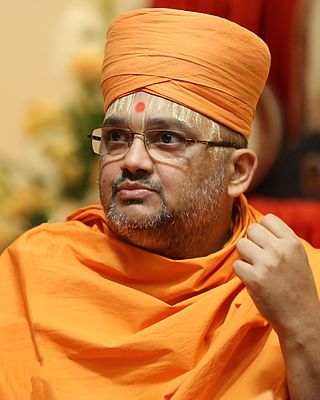
The Vishnu Sahasranama, is a Sanskrit hymn containing a list of the 1,000 names of Vishnu, one of the main deities in Hinduism and the Supreme God in Vaishnavism. It is one of the most sacred and popular stotras in Hinduism. The most popular version of the Vishnu Sahasranama is featured in the Anushasana Parva of the epic Mahabharata. Other versions exist in the Padma Purana, the Skanda Purana, and the Garuda Purana. There is also a Sikh version of the Vishnu Sahasranama found in the work Sundar Gutka.

Vishishtadvaita, is a school of Hindu philosophy belonging to the Vedanta tradition. Vedanta refers to the profound interpretation of the Vedas based on Prasthanatrayi. Vishishta Advaita, meaning "non-duality with distinctions", is a non-dualistic philosophy that recognizes Brahman as the supreme reality while also acknowledging its multiplicity. This philosophy can be characterized as a form of qualified monism, attributive monism, or qualified non-dualism. It upholds the belief that all diversity ultimately stems from a fundamental underlying unity.

Bochasanwasi Akshar Purushottam Swaminarayan Sanstha is a Hindu denomination within the Swaminarayan Sampradaya. It was formed in 1905 by Yagnapurushdas following his conviction that Swaminarayan remained present on earth through a lineage of gurus starting with Gunatitanand Swami.
The following list consists of notable concepts that are derived from Hindu culture and associated cultures traditions, which are expressed as words in Sanskrit or other Indic languages and Dravidian languages. The main purpose of this list is to disambiguate multiple spellings, to make note of spellings no longer in use for these concepts, to define the concept in one or two lines, to make it easy for one to find and pin down specific concepts, and to provide a guide to unique concepts of Hinduism all in one place.

Swaminarayan, also known as Sahajanand Swami, was a yogi and ascetic, who is believed by followers to be a manifestation of Krishna, or as the highest manifestation of Purushottam, and around whom the Swaminarayan Sampradaya developed.

Gunatitanand Swami, born Mulji Jani, was a prominent paramhansa of the Swaminarayan Sampradaya who was ordained by Swaminarayan and is accepted as the first spiritual successor of Swaminarayan by the Bochasanwasi Akshar Purushottam Swaminarayan Sanstha (BAPS). Born into a religious family in the small farming community of Bhadra in Gujarat, India, he first received religious education under his father's guru, Ramanand Swami before encountering Swaminarayan and becoming a swami under him at the age of 25. He was revered for his spiritual discourses and divine service

Muktanand Swami (1758–1830), born Mukunddas, was a swami and paramahansa of the Swaminarayan Sampradaya.

Radha-Krishna is the combined form of the Hindu god Krishna with his chief consort and shakti Radha. They are regarded as the feminine as well as the masculine realities of God, in several Krishnaite traditions of Vaishnavism.

The Vachanamrut is a sacred Hindu text consisting of 273 religious discourses delivered by Swaminarayan from 1819 to 1829 CE and is considered the principal theological text within the Swaminarayan Sampradaya. Compiled by four of his senior disciples, Swaminarayan edited and approved the scripture. As followers believe Swaminarayan to be Parabrahman, or God, the Vachanamrut is considered a direct revelation from God and thus the most precise interpretation of the Upanishads, Bhagavad Gita, and other important Hindu scriptures.
Akshar Purushottam Upasana is the BAPS-practice of worshiping Swaminarayan as a supreme being along with Gunatitanand Swami as his ideal devotee. It was formalized by Shastriji Maharaj from the teachings of Swaminarayan when he created the Bochasanwasi Shri Akshar Purushottam Swaminarayan Sanstha (BAPS) in 1907 after leaving the Swaminarayan Sampraday. It could also be referred to as Brahman Parabrahman Upasana or Bhakta Bhagwan Upasana. In this belief, Akshar and Para Brahman are worshiped together, and Para Brahman is present through the living ideal guru on Earth. Followers of BAPS regard Gunatitanand Swami as first the spiritual successor of Swaminarayan and then by Bhagatji Maharaj, Shastriji Maharaj, Yogiji Maharaj, Pramukh Swami Maharaj and Mahant Swami Maharaj..

Shri Swaminarayan Mandir, Dholera is a Hindu temple in Dholera, Gujarat, India, and is one of nine Shri Swaminarayan Temples built by Swaminarayan.
Premanand Swami (1784–1855) was a saint of the Swaminarayan Sampradaya and one of Swaminarayan's paramhansas.

The Swaminarayan Sampradaya, also known as Swaminarayan Hinduism and Swaminarayan movement, is a Hindu Vaishnava sampradaya rooted in Ramanuja's Vishishtadvaita, characterized by the worship of its charismatic founder Sahajanand Swami, better known as Swaminarayan (1781–1830), as an avatar of Krishna or as the highest manifestation of Purushottam, the supreme God. According to the tradition's lore, both the religious group and Sahajanand Swami became known as Swaminarayan after the Swaminarayan mantra, which is a compound of two Sanskrit words, swami and Narayan.

The Swaminarayan mantra, "Swaminarayan," is a mantra used by the Swaminarayan Sampradaya. It is a compound of two words: Swami and Narayan, that is, Vishnu c.q. Purushottam. According to the Swaminarayan-tradition, the Swaminarayan Mantra was introduced and explained by Swaminarayan, also known as Sahajanand Swami, spiritual head of the Swaminarayan Sampradaya, shortly after the death of his predecessor, Ramanand Swami. Devotees chant the Swaminarayan mantra to offer worship, to allay distress, to pray for the welfare of others, and at the end-of-life. Several scriptures of the Swaminarayan Sampradaya, such as the Swamini Vato, Harililamrut, and Bhaktachintamani, describe the power and efficacy of the Swaminarayan mantra for one who chants it.

Pranami Sampradaya, also known as Pranami or Pranami Panth is a Hindu sect which worships the god Krishna as the Supreme God. It is based on teachings of Mahamati Prannathji and Shri Devchandraji with their holy scripture as Shri Tartam Sagar.

Bhadreshdas Swami is a Sanskrit scholar and an ordained monk of the Bochasanwasi Akshar Purushottam Swaminarayan Sanstha (BAPS). In 2007 he completed the Swaminarayan Bhashyam, a five-volume classical Sanskrit commentary on the Prasthanatrayi. This commentary on Hinduism's three canonical texts: the Upanishads, Bhagavad Gita, and the Brahma sutras, forms the interpretive foundation of the philosophy of Akshar Purushottam darshana, also known as Swaminarayan darshana, illuminating the Vedic roots of the Akshar Purushottama philosophy, which was propagated by the 19th-century Hindu leader, Swaminarayan and later by Shastriji Maharaj.

Mahant Swami Maharaj is the present guru and president of the Bochasanwasi Akshar Purushottam Swaminarayan Sanstha (BAPS), a major branch of the Swaminarayan Sampradaya, a Hindu denomination. BAPS regards him as the sixth spiritual successor of Swaminarayan, following Gunatitanand Swami, Bhagatji Maharaj, Shastriji Maharaj, Yogiji Maharaj, and Pramukh Swami Maharaj. He is believed by his followers to be in constant communion with Bhagwan Swaminarayan, and ontologically, the manifestation of Akshar, the perfect devotee of God.

Akshar-Purushottam Darshan or Aksarabrahma-Parabrahma-Darsanam, "Akshar-Purushottam philosophy," is a designation used by BAPS as an alternative name for the Swaminarayan Darshana, Swaminarayan's view or teachings, to distinguish it from other Vedanta-traditions. It is based on Swaminarayan's distinction between Parabrahman and Aksharbrahman as two distinct eternal realities, which in this view sets Swaminarayan's teachings apart from other Vedanta-traditions. It is an essential element for the BAPS and it's Akṣara-Puruṣottama Upāsanā ("worship"), in which Purushottam c.q. Parabrahman is present in a lineage of Aksharbrahman guru's, who are the abode (akshar) of God.

The Swaminarayan Bhashyam (Svāminārāyaṇabhāṣyam) is a five-volume Sanskrit bhashya, or commentary, on the Prasthanatrayi (Prasthānatrayī) - the ten principal Upanishads (Upaniṣads), the Bhagavad Gita (Bhagavadgītā), and the Brahmasutras (Brahmasūtras) - which establishes the principles taught by Swaminarayan as perceived by the BAPS.

Om Namo Narayanaya, also referred to as the Ashtakshara, and the Narayana Mantra, is among the most popular mantras of Hinduism, and the principal mantra of Vaishnavism. It is an invocation addressed to Narayana, the god of preservation, the form of Vishnu who lays in eternal rest beneath the cosmic waters.

















